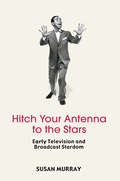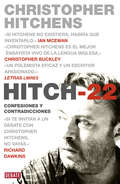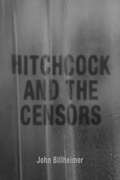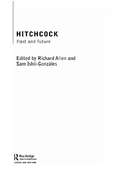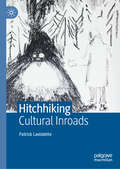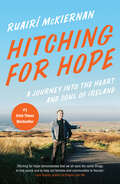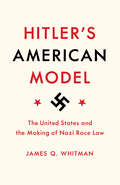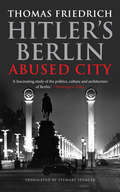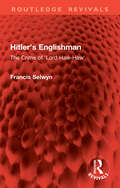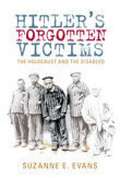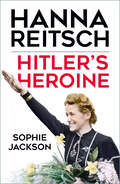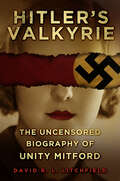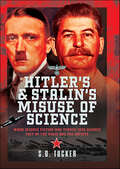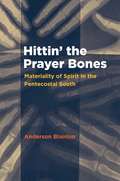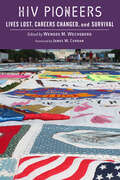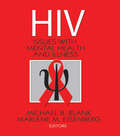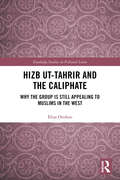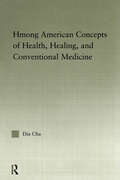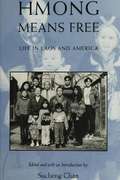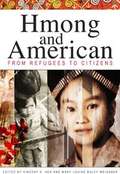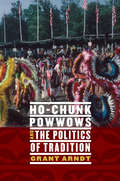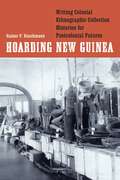- Table View
- List View
Hitch Your Antenna to the Stars: Early Television and Broadcast Stardom
by Susan MurrayFirst Published in 2005. Routledge is an imprint of Taylor & Francis, an informa company.
Hitch-22
by Christopher HitchensEn Hitch 22, sus esperadas memorias, Christopher Hitchens, el escritor politico por excelencia, repasa su vida hasta la actualidad, desde su infancia en Portsmouth con una madre que le adoraba, de destino trágico, y un padre reservado y distante; hasta su vida en Washington DC, desde donde ha escrito contra todo tipo de tiranías. En el camino recuerda los amigos, las batallas y las botellas, las grandes luchas y las causas perdidas, y los errores y las dudas que han definido su vida.Hitch 22 es un libro por turnos conmovedor, gracioso, delicioso, enfurecedor e inspirador. Un complemento indispensable a la vida y la obra de un intelectual fundamental de los últimos treinta años.
Hitchcock and the Censors (Screen Classics)
by John BillheimerEdgar Award Winner: This lively account of the director&’s battles with the Code Office is &“an essential addition to any Hitchcock shelf&” (Mystery Scene Magazine). From 1934 to 1968, the Motion Picture Production Code Office controlled the content and final cut on all films made and distributed in the United States. Code officials protected sensitive ears from standard four-letter words, as well as a few five-letter words like tramp and six-letter words like cripes. They also scrubbed &“excessively lustful&” kissing from the screen and ensured that no criminal went unpunished. Thus, throughout his career, Alfred Hitchcock had to deal with a wide variety of censors attuned to the slightest suggestion of sexual innuendo, undue violence, toilet humor, religious disrespect, and all forms of indecency, real or imagined. During their review of Hitchcock&’s films, the censors demanded an average of 22.5 changes, ranging from the mundane to the mind-boggling, on each of his American films. Code reviewers dictated the ending of Rebecca, absolved Cary Grant of guilt in Suspicion, edited Cole Porter&’s lyrics in Stage Fright, decided which shades should be drawn in Rear Window, and shortened the shower scene in Psycho. In Hitchcock and the Censors, John Billheimer traces the forces that led to the Production Code and describes Hitchcock&’s interactions with code officials on a film-by-film basis as he fought to protect his creations, bargaining with code reviewers and sidestepping censorship to produce a lifetime of memorable films. Despite the often-arbitrary decisions of the code board, Hitchcock still managed to push the boundaries of sex and violence permitted in films by charming—and occasionally tricking—the censors and by swapping off bits of dialogue, plot points, and individual shots (some of which had been deliberately inserted as trading chips) to protect cherished scenes and images. By examining Hitchcock&’s priorities in dealing with the censors, this work highlights the director&’s theories of suspense as well as his magician-like touch when negotiating with code officials.
Hitchcock: Past and Future
by Richard Allen Sam Ishii-GonzálesThis new collection of writings on Alfred Hitchcock considers Hitchcock both in his time and as a continuing influence on filmmakers, films and film theory. The contributions, who include leading scholars such as Slavoj Zizek, Laura Mulvey, Peter Wollen, and James Naremore, discuss canonical films such as Notorious and The Birds alongside lesser-known works including Juno and the Paycock and Frenzy. Articles are grouped into four thematic sections: 'Authorship and Aesthetics' examines Hitchcock as auteur and investigates central topics in Hitchcockian aesthetics. 'French Hitchcock' looks at Hitchcock's influence on filmmakers such as Chabrol, Truffaut and Rohmer, and how film critics such as Bazin and Deleuze have engaged with Hitchcock's work. 'Poetics and Politics of Identity' explores the representation of personal and political in Hitchcock's work. The final section, 'Death and Transfiguration' addresses the manner in which the spectacle and figuration of death haunts the narrative universe of Hitchcock's films, in particular his subversive masterpiece Psycho.
Hitchhiking: Cultural Inroads
by Patrick LavioletteThe first English-language social science book to comprehensively explore hitchhiking in the contemporary era in the West, this volume covers a lot of ground—it goes to and fro, in an echo of the modus operandi of most hitchhiking journeys. As scarification, piercings, and tattoos move from the counter-culture to popular culture, hitchhiking has remained an activity apart. Yet, with the assistance of virtual platforms and through its ever-growing memorialisation in literature and the arts, hitchhiking persists into the 21st century, despite the many social anxieties surrounding it. The themes addressed here thus include: adventure; gender; fear and trust; freedom and existential travel; road and transport infrastructures; communities of protest and resistance; civic surveillance and risk ecologies.
Hitching for Hope: A Journey into the Heart and Soul of Ireland
by Ruairi Mckiernan#1 Irish Times Bestseller!A modern travel tale—part personal pilgrimage, part political quest—that captures the power of human resilience"McKiernan sticks his thumb out, and somehow a healthy dose of humanity manages to roll up alongside him. . . . This book is a paean to nuance, decency and possibility."—Colum McCann, National Book Award winner and New York Times bestselling author of Let the Great World Spin and Apeirogon. Following the collapse of Ireland’s Celtic Tiger economy, social activist Ruairí McKiernan questions whether he should join the mounting number of emigrants searching for greater opportunity elsewhere. McKiernan embarks on a hitchhiking odyssey with no money, no itinerary and no idea where he might end up each night. His mission: to give voice to those emerging from one of the most painful periods of economic and social turmoil in Ireland’s history. Engaging, provocative and sincere, Hitching for Hope is a testimony to the spirit of Ireland. It is an inspirational manifesto for hope and healing in troubled times.
Hitching for Hope: A Journey into the Heart and Soul of Ireland
by Ruairí McKiernanA modern travel tale—part personal pilgrimage, part political quest—that captures the power of human resilience <P><P> "McKiernan sticks his thumb out, and somehow a healthy dose of humanity manages to roll up alongside him. . . . This book is a paean to nuance, decency and possibility."—Colum McCann, National Book Award winner and New York Times bestselling author of Let the Great World Spin and Apeirogon. <P><P> Following the collapse of Ireland’s Celtic Tiger economy, social activist Ruairí McKiernan questions whether he should join the mounting number of emigrants searching for greater opportunity elsewhere. McKiernan embarks on a hitchhiking odyssey with no money, no itinerary and no idea where he might end up each night. His mission: to give voice to those emerging from one of the most painful periods of economic and social turmoil in Ireland’s history. Engaging, provocative and sincere, Hitching for Hope is a testimony to the spirit of Ireland. It is an inspirational manifesto for hope and healing in troubled times.
Hitler's American Model: The United States and the Making of Nazi Race Law
by James Q. WhitmanNazism triumphed in Germany during the high era of Jim Crow laws in the United States. Did the American regime of racial oppression in any way inspire the Nazis? The unsettling answer is yes. In Hitler's American Model, James Whitman presents a detailed investigation of the American impact on the notorious Nuremberg Laws, the centerpiece anti-Jewish legislation of the Nazi regime. Contrary to those who have insisted that there was no meaningful connection between American and German racial repression, Whitman demonstrates that the Nazis took a real, sustained, significant, and revealing interest in American race policies.As Whitman shows, the Nuremberg Laws were crafted in an atmosphere of considerable attention to the precedents American race laws had to offer. German praise for American practices, already found in Hitler's Mein Kampf, was continuous throughout the early 1930s, and the most radical Nazi lawyers were eager advocates of the use of American models. But while Jim Crow segregation was one aspect of American law that appealed to Nazi radicals, it was not the most consequential one. Rather, both American citizenship and antimiscegenation laws proved directly relevant to the two principal Nuremberg Laws—the Citizenship Law and the Blood Law. Whitman looks at the ultimate, ugly irony that when Nazis rejected American practices, it was sometimes not because they found them too enlightened, but too harsh.Indelibly linking American race laws to the shaping of Nazi policies in Germany, Hitler's American Model upends understandings of America's influence on racist practices in the wider world.
Hitler's Berlin
by Stewart SpencerFrom his first visit to Berlin in 1916, Hitler was preoccupied and fascinated by Germany's great capital city. In this vivid and entirely new account of Hitler's relationship with Berlin, Thomas Friedrich explores how Hitler identified with the city, how his political aspirations were reflected in architectural aspirations for the capital, and how Berlin surprisingly influenced the development of Hitler's political ideas. A leading expert on the twentieth-century history of Berlin, Friedrich employs new and little-known German sources to track Hitler's attitudes and plans for the city. Even while he despised both the cosmopolitan culture of the Weimar Republic and the profound Jewish influence on the city, Hitler was drawn to the grandiosity of its architecture and its imperial spirit. He dreamed of transforming Berlin into a capital that would reflect his autocracy, and he used the city for such varied purposes as testing his anti-Semitic policies and demonstrating the might of the Third Reich. Illuminating Berlin's burdened years under Nazi subjection, Friedrich offers new understandings of Hitler and his politics, architectural views, and artistic opinions.
Hitler's Englishman: The Crime of 'Lord Haw-Haw' (Routledge Revivals)
by Francis Selwyn‘Lord Haw-Haw’ (William Joyce) was Hitler’s secret weapon of the airwaves. Nightly through the Second World War Joyce’s nasal tones were transmitted to a delighted if sceptical audience. He had a large and enthusiastic following, who looked upon his catchphrase ‘Jairmany calling’ as the promise of comic relief as sure as that provided by Tommy Handley and the much-loved radio programme It’s That Man Again (ITMA).Joyce, of course, was not a figure of fun; nor was he regarded as one by the British government which twisted and adjusted the law to bring him to a traitor’s death in 1946. Originally published in 1987, in this new approach to the case of William Joyce, Francis Selwyn looks both at the career of Joyce, the Irish-American-cum-Fascist bully-boy, and the changing nature of treason, altered by the events of the Second World War.Was Joyce a traitor? Or was he sent to the scaffold as a necessary sacrifice? Behind the voice of the decadent aristocrat lurked the real William Joyce, a street-corner fanatic of the Fascist movement. Who was he? Hitler’s Englishman follows the path to Nazi treason and the final reckoning on the gallows of Wandsworth Prison.Treason, as Francis Selwyn shows, is a crime which has been adapted to circumstances. After the Second Word War it was reshaped to embrace ‘new’ traitors, who had committed different kinds of treason. For Joyce, his loyalty to the ideals of Nazism transcended territory and nationality: he had no regrets about what he had done. His story, and the story of treason in the days of victory over Fascism, still have a powerful message for us today.
Hitler's Forgotten Victims: The Holocaust and the Disabled
by Suzanne EvansBetween 1939 and 1945, the Nazi regime systematically murdered hundreds of thousands of children and adults with disabilities as part of its 'euthanasia' policy. These programs were designed to eliminate all persons with disabilities who, according to Nazi ideology, threatened the health and purity of the German race. Hitler's Forgotten Victims explores the development and workings of this nightmarish process, a relatively neglected aspect of the Holocaust. Suzanne Evans's account draws on the rich historical record as well as scores of exclusive interviews with disabled Holocaust survivors. It begins with a description of the Nazis' Children's Killing Program, in which tens of thousands of children with mental and physical disabilities were murdered by their physicians, usually by starvation or lethal injection. The book goes on to recount the T4 euthanasia program, in which adults with disabilities were disposed of in six official centers, and the development of the Sterilization Law that allowed the forced sterilization of at least a half-million young adults with disabilities.
Hitler's Heroine: Hanna Reitsch
by Sophie JacksonHanna Reitsch longed to fly. Having broken records and earned the respect of the Nazi regime, she was the first female Luftwaffe test pilot, and eventually became Adolf Hitler’s personal heroine.An ardent Nazi, Hanna was prepared to die for the cause, first as a test pilot for the dangerous V1 flying bombs and later by volunteering for a suggested Nazi ‘kamikaze’ squadron. After her capture she complained bitterly of not being able to die with her leader, but she went on to have a celebrated post-war flying career. She died at the age of 67, creating a new mystery – did Hanna kill herself using the cyanide pill Hitler had given her over thirty years earlier? Hitler’s Heroine reveals new facts about the mysterious pilot and cuts through the many myths that have surrounded her life and death, bringing this fascinating woman back to life for the twenty-first century.
Hitler's Valkyrie: The Uncensored Biography of Unity Mitford
by David R L. LitchfieldEmerging from modern history as a remarkable and much-loved family, the Mitfords have remained largely unrepentant concerning theirs and particularly Unity’s enthusiastic support of Hitler, the Nazis, Oswald Mosley and British fascism. However, having initially encouraged and supported Unity’s affair with Hitler, they subsequently insisted that she had in fact been a rather unintelligent, clumsy lump of a girl, whose virginal relationship with one of the most terrifying dictators of all time was a mere unrequited romantic obsession. As this book will show, nothing could be further from the truth. Following further research and reexamination of the family’s, friends’ and journalists’ often contradictory evidence, plus new information supplied by the author’s own family and friends, Hitler’s Valkyrie will reveal that while Unity was, like Hitler, an extreme fantasist, there was very little of the juvenile romantic about her. On the contrary, she was highly intelligent, free-spirited and athletic. She was also the only Englishwoman who came close to being capable of changing the course of the Second World War. Here David R.L. Litchfield untangles the decades-old web of intrigue surrounding Unity Mitford and one of the most dangerous men of all time, creating a fascinating book of unparalleled importance to the Mitford legacy.
Hitler's and Stalin's Misuse of Science: When Science Fiction was Turned into Science Fact by the Nazis and the Soviets
by S. D. TuckerS.D. Tucker delves into the Nazi and Soviet historical hijacking of science by extreme ideologies, revealing the dangerous consequences of pseudoscientific narratives in today's world. In today’s world, science itself, which we are constantly being told is a neutral vehicle for wholly objective ideas and theories, is increasingly being hijacked and abused by the toxic modern cult of identity politics, of both left and right. But should we be too surprised by any of this? No, because this exact same sorry process has happened time and again before, under the rule of totalitarian political cults like the Nazis and the Soviets, both of which vigorously promoted various pseudoscientific theories of ‘Aryan Science’ and ‘Marxist Science’ on the sole grounds that they were ideologically correct as opposed to being factually so. Nazi racial pseudoscience and belief in nonsense like the ‘World Ice Theory’, which claimed that stars did not really exist and were actually just reflections of the sun off giant floating space-icebergs, were widely encouraged in the Third Reich, and used for long-term military weather-forecasting purposes. Likewise, the ideas of the renegade biologist Trofim Lysenko, who developed a deluded ‘anti-capitalist’ theory of genetics opposed to Darwin’s, were responsible for widespread famine in the USSR when Stalin allowed him to apply them practically towards the nation’s crop-harvests. Those academics and functionaries who disputed these clearly false pseudoscientific notions often found themselves in deep trouble – or, ultimately, dead. In this incisive and challenging study, author S.D. Tucker explores the often weird and fanciful theories that were proposed and took hold under these extreme regimes – and in doing so sends a word of warning to the modern world of the internet and social media where similar bizarre ideas are expounded and consumed with frightening gullibility. Everywhere from Western universities, schools and hospitals to Vladimir Putin’s Russia, absurd stories of sexist glaciers, racist gravity, socialist trees and NATO-backed mutant extra-terrestrial potatoes are being promoted as items of politically mandated scientific fact by compliant collaborators and credulous social media followers. Pseudoscientific narratives are even now used to justify the 2022 invasion of Ukraine, much as they were once used to justify the Nazi conquest of Europe or the spread of Communist revolution across the globe.
Hitler: 1889-1936 Hubris
by Ian KershawThis is a biography of Hitler from birth to 1936, and his creation of The Third Reich, i.e., Nazi Germany.
Hittin' the Prayer Bones
by Anderson BlantonIn this work, Anderson Blanton illuminates how prayer, faith, and healing are intertwined with technologies of sound reproduction and material culture in the charismatic Christian worship of southern Appalachia. From the radios used to broadcast prayer to the curative faith cloths circulated through the postal system, material objects known as spirit-matter have become essential since the 1940s, Blanton argues, to the Pentecostal community's understanding and performances of faith. Hittin' the Prayer Bones draws on Blanton's extensive site visits with church congregations, radio preachers and their listeners inside and outside the broadcasting studios, and more than thirty years of recorded charismatic worship made available to him by a small Christian radio station. In documenting the transformation and consecration of everyday objects through performances of communal worship, healing prayer, and chanted preaching, Blanton frames his ethnographic research in the historiography of faith healing and prayer, as well as theoretical models of materiality and transcendence. At the same time, his work affectingly conveys the feelings of horror, healing, and humor that are unleashed in practitioners as they experience, in their own words, the sacred, healing presence of the Holy Ghost.
Hiv Pioneers: Lives Lost, Careers Changed, and Survival
by Wendee M. WechsbergA moving collection of firsthand accounts of the beginning of the HIV epidemic in the 1980s.Tremendous strides have been made in the prevention and treatment of HIV since the disease first appeared in the 1980s. But because many of those who studied and battled the virus in its early days are now gone, firsthand accounts are at risk of being lost. In HIV Pioneers, Wendee M. Wechsberg collects 29 “first stories” from the outset of the AIDS epidemic. These personal narratives and historical essays not only shed light on the experiences of global health pioneers, prominent scientists, and HIV survivors, but also preserve valuable lessons for managing the risk and impact of future epidemics.With unprecedented access to many key actors in the fight against AIDS and HIV, Wechsberg brings to life the harrowing reality in the beginning of the epidemic. The book captures the experiences of those still working diligently and innovatively in the field, elevating the voices of doctors, scientists, and government bureaucrats alongside those of survivors and their loved ones. Focusing on the impact that the epidemic had on careers, pieces also show how governments responded to HIV, how research agendas were developed, and how AIDS service agencies and case management evolved.Illuminating the multiple facets of the HIV epidemic, both in the United States and across the globe, HIV Pioneers is a touching and inspirational look into the ongoing fight against HIV.“Anyone interested in science, social history, communicable diseases or epidemiology would benefit from reading this topical, fascinating and inspirational book.” —Fay Hartley, British Society for the History of Medicine
Hiv: Issues with Mental Health and Illness
by Michael B. Blank Marlene M. EisenbergLearn why it&’s time for a new era in mental health and prevention scienceHIV: Issues with Mental Health and Illness is a comprehensive examination of the co-morbidity that exists between HIV/AIDS and mental illness. Internationally recognized experts in the field analyze the latest research on why HIV sufferers are at risk of developing mental illness and how people who suffer from mental illness risk contracting HIV through sexual behavior and substance abuse. This unique book focuses on clinical and diagnostic issues, the organization of service delivery systems, and community-based interventions.HIV: Issues with Mental Health and Illness presents vital contributions from physicians, sociologists, nurses, social workers, and psychologists working to develop a plan to reduce the number of persons affected by the epidemic, and to improve the quality of life of those already HIV infected. Aimed at promoting a new era in mental health and prevention science, the book examines vital issues including: the interplay between depression, HIV, and chronic fatigue; condom use among adolescents with psychiatric disorders; predicting HIV risk and how targeted intervention can address multiple health risks; how an increase in emotional stress can affect African-American women concerned about becoming HIV infected; STI risk reduction strategies; how client gender can affect mental health care service delivery; and the implementation of intervention programs as part of supported housing programs.HIV: Issues with Mental Health and Illness examines: bridging the gap between research and practice depression and HIV schizophrenia and HIV mental health policy and infectious diseases HIV prevention community-based participatory research community psychology mental health disparities translation research transforming public health systemsHIV: Issues with Mental Health and Illness is an invaluable resource for public health workers and policymakers, psychologists, psychiatrists, social work nurses, infectious disease physicians, and addictions disease counselors.
Hizb ut-Tahrir and the Caliphate: Why the Group is Still Appealing to Muslims in the West (Routledge Studies in Political Islam)
by Elisa OrofinoInvestigating the appeal of the group Hizb ut-Tahrir (HT), the study expands on why non-violent radical forms of Islam still attract segments of Muslim communities in the West. Being one of the few comprehensive studies on HT, this book discusses how this Islamist group advocate for the caliphate and for the implementation of shari’a but also reject violence as a tool to achieve these goals. Through interviews with current HT members, observation at HT-sponsored events and social media analysis, this book leads the reader into the world of vocal radical Islamist groups, exploring their goals and activities in Western states, with a special focus on the UK and Australia. In fact, as many other non-violent Islamist groups, HT represent the choice of all those individuals who might share Islamist arguments but who reject the use of violence. Given their non-violent nature, vocal radicals are mostly free to operate in the Western world, attracting new members, conducting a relentless campaign against the "West as a system" and representing a serious source of concern not only for national authorities but for the broader Muslim community. This book stands as an original publication and paves the way to a new area of study crossing sociology, Islamic studies and political sciences. This book is one of the few contributions on vocal and radical Islamism to date.
Hmong American Concepts of Health (Studies in Asian Americans)
by Dia ChaAmerica's healthcare system in the twenty-first century faces a variety of pressures and challenges, not the least of which is that posed by the increasingly multicultural nature of American society itself. Large numbers among the Hmong, immigrants from the landlocked Asian nation of Laos, continue to prefer their own ancient medical traditions. That these Hmong Americans should continue to adhere to a tradition of folk medicine, rather than embrace the modern healthcare system of America, poses questions that must be answered. This book takes up the task of examining Hmong American concepts of health, illness and healing, and looks at the Hmong American experience with conventional medicine. In so doing, it identifies factors that either obstruct or enable healthcare delivery to the Hmong, specifically a target sample of Hmong Americans resident in Colorado. Drawing upon scientific methods of data collection, the research reveals attitudes currently held by a group of American citizens toward health and medicine which run the gamut from the very modern to those which have prevailed in the highlands of Southeast Asia for centuries.
Hmong Means Free: Life in Laos and America
by Sucheng ChanThis collection of evocative personal testimonies by three generations of Hmong refugees is the first to describe their lives in Laos as slash-and-burn farmers, as refugees after a Communist government came to power in 1975, and as immigrants in the United States. Reflecting on the homes left behind, their narratives chronicle the difficulties of forging a new identity. From Jou Yee Xiongs Life Story: ""I stopped teaching my sons many of the Hmong ways because I felt my ancestors and I had suffered enough already. I thought that teaching my children the old ways would only place a burden on them. ""From Ka Pao Xiongs (Jou Yee Xiongs son) Life Story: ""It has been very difficult for us to adapt because we had no professions or trades and we suffered from culture shock. Here in America, both the husband and wife must work simultaneously to earn enough money to live on. Many of our children are ignorant of the Hmong way of life. . . . Even the old people are forgetting about their life in Laos, as they enjoy the prosperity and good life in America. ""From Xang Mao Xiongs Life Story: ""When the Communists took over Laos and General Vang Pao fled with his family, we, too, decided to leave. Not only my family, but thousands of Hmong tried to flee. I rented a car for thirty thousand Laotian dollars, and it took us to Nasu. . . . We felt compelled to leave because many of us had been connected to the CIA. . . . Thousands of Hmong were traveling on foot. Along the way, many of them were shot and killed by Communist soldiers. We witnessed a bloody massacre of civilians. ""From Vue Vangs Life Story: ""Life was so hard in the Thai refugee] camp that when we found out we could go to the United States, we did not hesitate to grasp the chance. We knew that were we to remain in the camp, there would be no hope for a better future. We would not be able to offer our children anything better than a life of perpetual poverty and anguish. ""
Hmong and American: From Refugees to Citizens
by Vincent K. Her Mary Louise Buley-MeissnerFarmers in Laos, U. S. allies during the Vietnam War, refugees in Thailand, settlers in the Western world--the stories of the Hmong have been told in detail through books and articles and oral histories over the past several decades. Like any immigrant group, the first generation may yearn for the past as they watch their children and grandchildren find their way in the dominant culture of their new home. For Hmong people born and educated in the United States, a definition of self often includes traditional practices and tight-knit family groups but also a fully Americanized point of view. How do these members of the "1. 5" and second generation of American Hmong negotiate the expectations of these two cultures? How can their classmates and neighbors better understand what it means to be both Hmong and American? In this collection of essays, historians, sociologists, teachers, counselors, and artists explore the concepts of war, refugee status, resettlement, and assimilation, weaving their own stories into their depictions of a community that continues to develop complex identities, both abundantly shared and deeply personal. From the review by Mark Pfeifer: "The discussions and case studies presented on the different facets of contemporary Hmong identity are the most unique aspect of the Her/Buley-Meissner manuscript and provide the strongest argument for its publication. No other recent monograph has focused as exclusively or strongly on Hmong American identity to this degree. " From the review by Chia Youyee Vang: "The diversity of voices and perspectives makes this volume very powerful. Inclusion of scholars, creative writers and artists makes the volume interdisciplinary and potentially accessible to a broad audience . . . Collectively, they show that Hmong culture has not been static; instead, Hmong culture and its traditions have served as sites of change and disagreement. "
Ho Promesso di Non Dirlo: Crescere un figlio transgender
by Cheryl B. EvansVincitore della Medaglia di Bronzo come 2017 Readers' Favorite dell'International Book Awards Contest. Quando ti nasce una figlia, immagini che succederanno molte cose nella sua vita, ma diventare un ragazzo non è una di queste. Questo libro sarà d'aiuto per chiunque desideri saperne di più sulla disforia di genere, ed è assolutamente da leggere per un genitore, parente o amico di una persona transgender o che sta mettendo in discussione il proprio genere. Scritto da Mamma, è un memoriale intenso e profondo sulla scoperta del figlio che non aveva mai saputo di avere. Sincero, commovente e ben scritto, non rimarrete delusi! "Probabilmente uno dei libri più importanti scritti fino ad oggi su un problema sociale controverso e incompreso. Se stai affrontando una situazione simile con tuo figlio o tua figlia ti invito a leggerlo: entrambi avete bisogno di ciò che Cheryl ha così gentilmente condiviso con lettori e genitori. Di certo ti susciterà una forte ammirazione non solo per il coraggio mostrato da Jordan, ma anche per l'amore che Cheryl e suo marito hanno per i loro figli e la compassione per tutte le persone. L'ho adorato, non riuscivo a metterlo giù. Ne raccomando vivamente la lettura." Readers' Favorite 5 stelle Ciò che questa storia ha di unico è il seguire un bambino transgender dalla nascita fino ai diciotto anni, concedendo al lettore una percezione reale di quello che la famiglia ha affrontato. Il disperato sforzo di conformarsi alle norme di genere sociali, un tentato suicidio, la lotta fra Dio e il transgenderismo, un tragico lutto e molto di più. Ogni passaggio della transizione da femmina a maschio (FtM) viene discusso nel dettaglio, incluse la terapia sostitutiva ormonale e gli interventi di riassegnazione di genere. Questo libro condivide tutto ciò sperando di fare una differenza in quello che sembra essere un mondo duro e crudele per le persone transgender. Cheryl è passata dal non s
Ho-Chunk Powwows and the Politics of Tradition
by Grant ArndtHo-Chunk powwows are the oldest powwows in the Midwest and among the oldest in the nation, beginning in 1902 outside Black River Falls in west-central Wisconsin. Grant Arndt examines Wisconsin Ho-Chunk powwow traditions and the meanings of cultural performances and rituals in the wake of North American settler colonialism. As early as 1908 the Ho-Chunk people began to experiment with the commercial potential of the powwows by charging white spectators an admission fee. During the 1940s the Ho-Chunk people decided to de-commercialize their powwows and rededicate dancing culture to honor their soldiers and veterans. Powwows today exist within, on the one hand, a wider commercialization of and conflict between intertribal “dance contests” and, on the other, efforts to emphasize traditional powwow culture through a focus on community values such as veteran recognition, warrior songs, and gift exchange. In Ho-Chunk Powwows and the Politics of Tradition Arndt shows that over the past two centuries the dynamism of powwows within Ho-Chunk life has changed greatly, as has the balance of tradition and modernity within community life. His book is a groundbreaking study of powwow culture that investigates how the Ho-Chunk people create cultural value through their public ceremonial performances, the significance that dance culture provides for the acquisition of power and recognition inside and outside their communities, and how the Ho-Chunk people generate concepts of the self and their society through dancing.
Hoarding New Guinea: Writing Colonial Ethnographic Collection Histories for Postcolonial Futures (Critical Studies in the History of Anthropology)
by Rainer F. BuschmannHoarding New Guinea provides a new cultural history of colonialism that pays close attention to the millions of Indigenous artifacts that serve as witnesses to Europe&’s colonial past in ethnographic museums. Rainer F. Buschmann investigates the roughly two hundred thousand artifacts extracted from the colony of German New Guinea from 1870 to 1920. Reversing the typical trajectories that place ethnographic museums at the center of the analysis, he concludes that museum interests in material culture alone cannot account for the large quantities of extracted artifacts. Buschmann moves beyond the easy definition of artifacts as trophies of colonial defeat or religious conversion, instead employing the term hoarding to describe the irrational amassing of Indigenous artifacts by European colonial residents. Buschmann also highlights Indigenous material culture as a bargaining chip for its producers to engage with the imposed colonial regime. In addition, by centering an area of collection rather than an institution, he opens new areas of investigation that include non-professional ethnographic collectors and a sustained rather than superficial consideration of Indigenous peoples as producers behind the material culture. Hoarding New Guinea answers the call for a more significant historical focus on colonial ethnographic collections in European museums.
